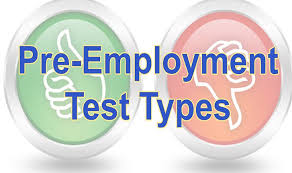Types of Pre-Employment Tests to Give an Interviewee!
When inviting prospects for an interview and making hiring decisions, HR professionals benefit from as much information as possible, including pre-employment test results.
During the interviewing process, pre-employment exams are a standardized and objective method of collecting candidate information. Assuming that these tests are professionally designed and well-validated, they are one of the most efficient and trustworthy methods for gaining accurate insights into the characteristics, skills, knowledge, and abilities of prospective employees.
There are numerous Types of Pre-Employment Tests, and they are all intended to establish whether an applicant is a suitable match for a position.
The Types of Pre-Employment Tests you conduct is entirely dependent on the position for which you are recruiting. Therefore, you must comprehend the requirements of the position, including the information, skills, and talents that prospective recruits must possess in order to properly perform their duties.
However, pre-interview testing benefits more than just employers and recruiters. According to Eliza Nimmich, cofounder and chief operating officer of online and in-person tutoring and exam preparation company Tutor the People, ’employees also benefit from skill evaluation. No one should be in a position where they are unable to perform. Employees who can readily become active are more likely to enjoy their jobs.
Here are eight Types of Pre-Employment Tests to administer during the interview stage.
List of the Types of Pre-Employment Tests
The following is a list of the Types of Pre-Employment Tests:
1. Aptitude tests

This Types of Pre-Employment test, also known as aptitude tests, measure an individual’s problem-solving, learning, and application of new information. They also measure critical thinking, and since critical thinking skills are essential for a wide variety of occupations, aptitude tests can be administered in virtually any professional setting.
As Nimmich asserts, tests can assess independently how much experience and skill a candidate needs for a specific mission. Using an analytical, quantitative calculation method, you will extrapolate more precisely the employee’s potential after-employment productivity.
There are a variety of different tests that fall under the umbrella of aptitude tests, including:
Numerical reasoning tests: Tests of numerical reasoning typically include questions based on graphs and statistics. They evaluate an individual’s speed and accuracy in number comprehension.
Abstract reasoning tests: Abstract reasoning tests, also known as inductive reasoning tests, are used to evaluate an individual’s logic comprehension. Using shapes and patterns, they intend to evaluate lateral reasoning and fluid intelligence.
Verbal reasoning tests: Verbal reasoning tests evaluate a candidate’s ability to understand, analyze, and comprehend text passages. Each section of text is followed by a question, which typically become progressively more difficult.
In-tray and e-tray tests: In-tray and e-tray tests are used to assess a candidate’s ability to deal with real-world work situations, such as conflicting schedules, multiple requests, and tight deadlines. They are frequently used for administrative positions, which require the ability to manage time and prioritize work.
2. Psychometric tests
This Types of Pre-Employment Tests provide a way of determining a person’s suitability for a position and offer a comprehensive technique of sorting through many candidates. They’re effective in showing recruiters something more than academic results and are a terrific tool to employ at the beginning of the recruitment process.
Psychometric tests exist in a variety of formats and are typically used to assess intellect, skills, critical thinking ability, and job-related competences. This is a standardized, organized method of evaluating specific features or talents of an individual.
One example of this Types of Pre-Employment Tests is that it is a situational judgement test (SJT). SJTs assess behavior and attitudes in relation to occupational settings. They offer candidates with circumstances they may encounter on the job, as well as feasible solutions for managing those situations. Candidates must choose the best effective response to a given scenario from the provided options.
3. Skills tests
The purpose of this Types of Pre-Employment Tests is to evaluate the relevant competencies for a certain position. They can be broad, assessing verbal, mathematical, and communication skills, or specialized, assessing typing or computer skills, for instance.
According to Victoria Sehgal of the recruitment consulting firm Peyton Ames, assessments that evaluate technical skills help the recruiter to sift out candidates with impressive resumes but little substance, as well as those from non-traditional backgrounds who cannot prove themselves on a resume alone.
In contrast to psychometric exams, skills assessments are based on the ability and competence to do a task efficiently. Psychometric assessments, in contrast, are founded on verified theories and statistical analysis. Additionally, they are conducted throughout the latter stages of the employment procedure. The greatest disadvantage of skills testing is that they can be time-consuming, especially during the evaluation process.
4. measures of cognitive abilities

These Types of Pre-Employment Tests measure a variety of cognitive skills, including linguistic and mathematical aptitude, mechanical reasoning, reading comprehension, and memory capacity.
The two categories of cognitive ability tests are as follows:
Fluid intelligence: Fluid intelligence is the ability to distinguish between numerous aspects, remember new information, and deal with challenges in a variety of situations.
Crystallised intelligence: Intelligence that has been crystallised is a person’s aptitude to use facts and their experience to complete various jobs.
This Types of Pre-Employment Tests tests have proven to be highly accurate predictors of job performance and are routinely employed in a wide variety of job selection processes. These tests are one of the least expensive selection approaches (several are available online for free), and their predictive value grows as job complexity rises.
Despite their benefits, cognitive ability tests have been shown to be susceptible to ethnic and racial disparities; therefore, managers and HR professionals should administer them in conjunction with other tests.
5. Psychological tests
This Types of Pre-Employment Tests assess behavioral characteristics. Personality assessments that evaluate qualities relevant to job performance have been demonstrated to be accurate predictors of future job performance.
Consciousness, agreeableness, openness, extraversion, motivation, and emotional ability are widely evaluated factors. Researchers have discovered that conscientiousness is one of the most accurate predictors of job performance.
According to Sehgal, assessments are useful during the hiring process since they provide further insight into a candidate’s personality. Personality assessments allow interviewers and recruiters to delve further into features that could be deal-breakers in terms of culture or manager fit.
Although other criteria are also useful indicators of performance in certain occupations, personality tests typically consist of multiple-choice or true-or-false questions measuring various personality traits. On personality tests, there are no correct or incorrect responses. It is more a question of whether the individual is a good fit, not only in terms of job fit but also in terms of cultural fit.
6. Tests of physical health and ability
In a few selection scenarios, physical ability tests are employed. They focus on physical traits of job candidates, such as endurance, strength, and overall fitness required to execute the work, such as endurance, strength, and general fitness.
As well as firefighting equipment, firefighters must be able to transport people out of burning structures. Lifeguards, military personnel, construction workers, choreographers, and police officers also demand physical condition.
Physical ability tests are an excellent indicator of an individual’s fitness level, but you need also consider age, gender, and ethnicity when evaluating results.This is also another Types of Pre-Employment Tests.
7. Reliability checks
This Types of Pre-Employment Tests were among the earliest pre-employment examinations administered and are still used to predict work performance. They examine attitudes and experiences relating to a person’s dependability, honesty, and trustworthiness.
There are two types of integrity testing: overt integrity tests and covert integrity tests. Overt integrity tests involve asking questions directly related to ethics and integrity. In contrast, covert examinations evaluate personality traits associated with integrity, such as conscientiousness.
Integrity tests, like many of the aforementioned examinations, are often done in multiple-choice style. They are regarded less biased than other tests because there are few disparities between individuals of different ethnicities or ages. The greatest risk with regard to integrity tests is candidates forging their answers, particularly with regard to overt integrity exams.
8. Presentations

Presentations are frequently used to evaluate a person’s capacity to think under duress. Whether you’re pitching an idea or a product, this type of test measures your level of confidence and your communication skills.
Asking a candidate to give a presentation is a terrific approach to judge his or her thoroughness and suitability for particular positions. This also demonstrates to recruiters the candidate’s cognitive processes and levels of inventiveness.
FAQs On Types of Pre-Employment Tests
What are the most common types of pre-employment tests?
The most common types, IQ tests, measure general mental ability. Other tests gauge verbal ability, math skills, spatial perception, or inductive and deductive reasoning. Physical ability tests measure strength, endurance and muscular movement. Aptitude tests measure an applicant's ability to learn a new skill.
What test is used in recruitment?
Pre-employment assessments – such as work samples, cognitive ability tests, and job knowledge tests – are good predictors of job performance. These candidate assessment tools can be administered quickly and easily through well-designed software.
What is a pre-employment evaluation?
Pre-employment, or job assessments, are any tool or method used to evaluate job candidates with consistency. They range from hard skills tests, such as on demand assessments, that consist of typing and math skills tests, to “softer” tests, like personality batteries.
see also
- 15 Best Colleges with Kinesiology Majors
- 25 Justified Reasons to Fire an Employee
- Grants for Homeless Individuals in 2023
- Free Online Beauty Courses with Certificates 2023
- Best marine biology colleges in california 2023
- 20 Best Animation Schools in California
- Best Electrician Trade Schools In The World | 2023

